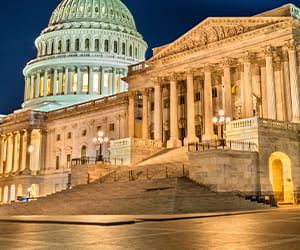New York enacts 2020 budget: Tax highlights
Corporate Income Tax Provisions
Net GILTI Apportionment (Part C)
The Budget Bill provides guidance on the apportionment of global intangible low-taxed income (GILTI), as defined by Section 951A of the Internal Revenue Code (IRC). Under the Budget Bill, receipts constituting net GILTI are included in the sales factor apportionment faction. Net GILTI is excluded from the apportionment numerator but included in the denominator. The Budget Bill amends both the New York State as well as New York City corporate income tax provisions. The new rule applies to taxable years beginning on or after Jan. 1, 2018.
Qualified New York Manufacturers (Part D)
As of Jan. 1, 2014, certain qualified New York manufacturers were entitled, inter alia, to a reduced tax rate of zero percent. Under prior law, the test to determine eligibility, in part, relied upon having manufacturing property in New York with a federal adjusted basis of $1 million. The Budget Bill broadens eligibility by changing the reference from “federal” adjusted basis to “New York” adjusted basis. The Budget Bill amends both the New York State as well as New York City corporate income tax provisions. The new rule takes effect immediately and applies to taxable years beginning on or after Jan. 1, 2018.
Decoupling from Tax Cuts and Jobs Act (TCJA) Amendments to Federal Section 118 (Part X)
Under the TCJA, Section 118 of the IRC was amended to require certain incentives offered by a governmental entity to a corporation’s capital be included in federal gross income. The Budget Bill restores New York exempt treatment for these subsidies. The new rule takes effect immediately for tax years beginning on or after Jan. 1, 2018.
Personal Income Tax Provisions
Extension of “Millionaire’s Tax” (Part P)
The top personal income tax rate of 8.82 percent had been set to expire after 2019. The Budget Bill extended the “Millionaire’s Tax” for five years, through 2024.
Extension of Charitable Contribution Deduction Limitation (Part Q)
The charitable contribution deduction is limited to 50 percent of the federal deduction for New Yorkers with an adjusted gross income (AGI) between $1–10 million and 25 percent for New Yorkers with an AGI over $10 million. These limitations were set to expire after 2019. The Budget Bill extended them for five years, through 2024.
Certain Nonresident Gambling Winnings Treated As New York Source Income (Part M)
The Budget Bill amends Section 631 of the Tax Law to include New York gambling winnings in excess of $5,000 as New York source income of a nonresident. The Budget Bill similarly requires withholding, amending Section 671 of the Tax Law, if such winnings are subject to federal withholding. The new provisions take effect immediately and apply to taxable years on or after Jan. 1, 2019.
Sales Tax Provisions
Marketplace Provider Nexus (Part G)
Like many other states recently, under the Budget Bill, New York now requires marketplace providers to collect sales and use taxes on sales of tangible personal property they facilitate. A marketplace provider is a person who, pursuant to an agreement with a marketplace seller, facilitates sales of tangible personal property, essentially, by providing a forum for the sale to take place. For nexus purposes, a marketplace provider without a physical presence in New York must have cumulative total gross receipts of $300,000 or more than 100 sales in the prior four quarters. The provisions take effect immediately and apply to sales made on or after June 1, 2019.
Vendors Permitted to Advertise Payment of Sales Tax on Behalf of Customers (Part DDD)
Vendors required to collect tax may now advertise to a retail purchaser that they will pay the tax due on behalf of the purchaser. The vendor must state that it will pay the tax and must not represent that the transaction is exempt or nontaxable. The new provision takes effect immediately.
Real Property Tax Provisions
Real Property Transfer Tax (Part OOO)
The Budget Bill imposes an additional real property transfer tax of $1.25 per $500 (0.25 percent) of consideration for residential properties in New York City valued over $3 million and nonresidential properties in New York City valued over $2 million. In addition, the Budget Bill expanded the existing “Mansion Tax,” which applies to sales of residential real property where the consideration paid is $1 million or more. Under the Budget Bill, a supplemental Mansion Tax applies at 0.25 percent where the consideration paid is $2 million ranging up to 2.90 percent where consideration paid is $25 million or more. The new provisions take effect on July 1, 2019.
Real Property Tax Cap Made Permanent (Part NNN)
The 2 percent cap on real property taxes, originally enacted in 2012, was made permanent by the Budget Bill.
Miscellaneous Tax Provisions
Undue Economic Hardship Limitation Upon Driver License Suspension (Part EEE)
New York is one of a few states that will suspend a taxpayer’s driver license for owing $10,000 or more in unpaid taxes. The Budget Bill provides relief authorizing an exception from suspension for taxpayers who receive public assistance or supplemental security income or who can demonstrate that suspension will cause undue economic hardship.
Congestion Pricing (Subpart A)
New York City will introduce the first congestion pricing program in the nation, otherwise known as Central Business District Tolling. A six-member Traffic Mobility Review Board will be established to oversee the new tolls imposed on cars and trucks driving south of 60th Street in Manhattan. Revenues will be dedicated to MTA capital needs. Tolls will not begin before Dec. 31, 2020.
Vapor Products Tax (Part UU)
The Budget Bill enacts a new 20 percent supplemental tax on sales of vapor products.
Opioid Excise Tax (Part XX)
The Budget Bill enacts a new excise tax on sales of opioids. Notwithstanding, sales to hospice and chemical dependency programs are exempt.
What Does CohnReznick Think?
The Budget Bill enacted numerous significant tax provisions affecting taxpayers, individuals and businesses, transacting business within New York across multiple tax types and multiple industries. Given the number and complexity of the changes, taxpayers need to understand how these changes impact their specific tax positions. We will continue to monitor these developments and their impact upon New York and non-New York taxpayers. Businesses and individuals should take steps to familiarize themselves with the new provisions to ensure proper compliance.
Corey Rosenthal
Contact
Let’s start a conversation about your company’s strategic goals and vision for the future.
Please fill all required fields*
Please verify your information and check to see if all require fields have been filled in.

Tax Reform: The Tax Cuts and Jobs Act – What you need to know, now
Related services
Any advice contained in this communication, including attachments and enclosures, is not intended as a thorough, in-depth analysis of specific issues. Nor is it sufficient to avoid tax-related penalties. This has been prepared for information purposes and general guidance only and does not constitute legal or professional advice. You should not act upon the information contained in this publication without obtaining specific professional advice specific to, among other things, your individual facts, circumstances and jurisdiction. No representation or warranty (express or implied) is made as to the accuracy or completeness of the information contained in this publication, and CohnReznick LLP, its partners, employees and agents accept no liability, and disclaim all responsibility, for the consequences of you or anyone else acting, or refraining to act, in reliance on the information contained in this publication or for any decision based on it.












